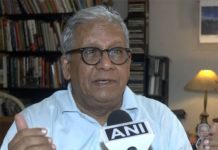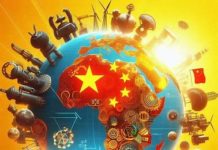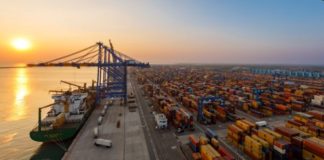The picture shows Gautam Adani with Benjamin Netanyahu, signing the Haifa Port agreement, shortly after his 60th birthday.
Gautam Adani is 61, and unshaken
By RN Bhaskar
It will soon be a year since I wrote my book on Gautam Adani (Gautam Adani: Reimagining Business in India and the World published by Penguin). The original plan was to release the book on 24 June 2022, when he had turned 60. But Penguin’s schedules could not meet the deadline. So, the book got released on 5 November 2022 at IIM Ahmedabad.
Just as I had expected, the book did wonderfully well in the markets. Gautambhai was a legend. Everybody wanted to know more about him.
Then came the Hindenburg bombshell. Many predicted that the H bomb would mean the end of the Adani group. Yet, in interview after interview, in discussions and conferences, I maintained that at best the Hindenburg report might slow him by a few months. But he would spring back, I predicted.
No, it was not blind adulation for Gautam Adani. It was a measured assessment of a person I had the fortune and benefit of observing and studying for almost 18 years. And that had taught me that this person was not the usual type of entrepreneur. There was a lot more of grit, an immense amount of strategic thinking, and an abiding faith in his capabilities that marked him out as being different from many other entrepreneurs that India, or the world, had seen.
First generation entrepreneur
True, he was a first-generation entrepreneur. Like almost every first-generation entrepreneur, Gautambhai too had his share of troubles that he had to confront and sometimes circumvent. But there were two differences. First, other first-generation entrepreneurs did not have to meet the challenges that today’s first-generation businessmen have to face. For instance, there were few rules then about where to raise money from, or even how. Second, there were few lobbyists then trying to block entrepreneurs in the name of environment, morality, protection of tribal culture or preventing fund managers from backing such enterprises.
Gautambhai had to overcome all such obstacles. He had to come to terms with the realisation that common sense had little value in these times. There was obviously no sense in trying to block the construction of the Dhamra port in the name of protecting Ridley turtles. Yet when the port was built by the Tatas and Larsen & Toubro, there was nobody around to tell the lobbyists that the Ridley turtles were still around. They were still breeding and hatching a new generation of turtles near the newly built port. Nothing had changed. The hue and cry raised by the lobbyists had died. The supporters of the turtles had disappeared. India had become a place where there were no penal costs for lobbying or delaying a project on such frivolous grounds.
Development for tribals
The other fallacy was protecting tribal culture. People forgot that even tribals have a right to keep pace with the prosperity and education that the rest of the world had access to. You could not condemn tribals of the Andaman Islands to continue living a primitive life, in much the same way as tribals in Jharkhand or Chhattisgarh. They have the right to standing up as equals in a rapidly changing world. It was unfair to keep tribals in a glass fishbowl from which they could not escape, while the so-called world of the lobbyists could marvel at their primitive state with their oohs! and their aahs!!.
As was discovered in Australia, most of the protestors did not really belong to the areas from where the tribals came. They were outsiders, often funded by people who wanted to stop someone or some project for reasons that were not immediately clear. But the funding obviously came from somewhere, and it was not from the tribals.
Finally, Gautam Adani had been there and seen it all. He had survived attempts to kidnap him. He had survived a gruesome terrorist attack on the Taj Mahal hotel where he was dining with some associates. Neither left him shaken or unsettled. It was obvious that he would weather the Hindenburg storm as well. He would bounce back, even stronger than before.
Hindenburg’s fallacies
Consider three aspects. As mentioned earlier, Hindenburg is a self-acknowledge short-seller who conducted trades in a manner that would leave him richer the more the value of Adani’s stock tumbled. Since his intent was to wreak as much destruction as possible, it was inevitable that he would magnify issues irresponsibly. Take a sampling – Hindenburg said that this was the biggest con in the world. Really? What about Enron? Or Bernie Madoff, or the crypto-currency conmen? Those were frauds. The Adani group did not fall into their category by any stretch of the imagination.
Take a second aspect. Has Gautambhai purchased any luxury yachts? Or built fancy villas for himself and his family? Or embarked on vanity projects? The answer to these three questions is a simple, and unequivocal NO. All the money that was with the group went into building assets, and implementing projects without time or cost overruns. No wonder, banks continue to lend money to him. None of his projects is loss making. None of the banks has faced any slippage in payment of either interest or principal. In terms of cashflow, he remains as solvent as the best of industrialists.
Take a third factor. The Adani group is backed with solid assets – not mere chimera of fanciful financial castles being built on other people’s money. Much of the money is his own, and the money borrowed is being paid back as scheduled. And from a very lay person’s point of view, what eventually matters is not how the money came in to fund the projects. Much more important is how the money was used – for personal profit, or for building national assets. Savvy analysts were aware that any country can import oil, petrochemicals, steel, and cement. But countries cannot import electricity, or ports and airports. These must be built if the country has to grow. Singapore grew because, despite a lack of natural resources, it built the finest of ports, and focussed on very efficient logistics. Good financial discipline, vision and efficiency are what made Singapore, South Korea, Japan, and China wealthy.
Business and national interests
Finally, The Adani group knows that the future of a country depends on doing three things at the same time. First to set up nationally relevant projects. Second, to remain profitable so that cross subsidies would not be required. Third, to focus on both employment and education. Without education, a future generation of employees becomes a bottleneck. Without employment, a nation’s social harmony is at stake. Adani has successfully focussed on both.
Gautam Adani made his critics confront all these just after he turned sixty and before he became sixty-one. It is a birthday that he should cherish, because he has triumphed over so much in the interim period between the two birthdays. Happy birthday Gautambhai!










































COMMENTS